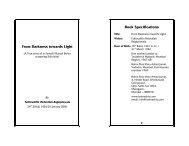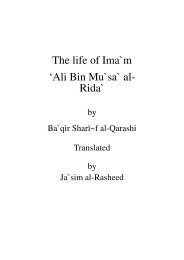The Bohra Faith - Bohra Shia Isna Ashari Jamaat
The Bohra Faith - Bohra Shia Isna Ashari Jamaat
The Bohra Faith - Bohra Shia Isna Ashari Jamaat
You also want an ePaper? Increase the reach of your titles
YUMPU automatically turns print PDFs into web optimized ePapers that Google loves.
<strong>The</strong> <strong>Bohra</strong> <strong>Faith</strong> 13 14 <strong>The</strong> <strong>Bohra</strong> <strong>Faith</strong><br />
non-existence (lays). We know nothing about Him. <strong>The</strong><br />
only possibility of the recognition of His unity is to admit<br />
our inability to recognize Him. <strong>The</strong> nearest approach to<br />
the knowledge of the Supreme God (al-Mubdi) is only<br />
possible by the recognition of an intermediary. 12<br />
Ismailism cycles<br />
Ismailism emphasizes cycles. Owing to differences<br />
in time and place one revelation is insufficient. <strong>The</strong>re<br />
have, therefore, been cycles of revelation, each intiated<br />
by a Prophet or Natiq, a speaker. <strong>The</strong>se have been<br />
Adam, Noah, Abraham, Moses, Jesus and Muhammad.<br />
A Prophet or Natiq brings a revelation of religious truth,<br />
not abrogating the revelation of his predecessor, but<br />
adapting it to the new time and situation. He is the<br />
speaker, the one who proclaims the revelation. With the<br />
Prophet through-out his life must be another known as<br />
the Asas, who is also, but less commony, called the<br />
Samit, or Silent One. After each Prophet there are six<br />
Imams, followed again by the seventh who initiates a<br />
new cycle, and really ranks as a Prophet. Distinctive of<br />
Ismailism in the Fatimid period is the place given to Ali<br />
ibn Abi Talib, as Asas, or Asas al Imamat, the foundation<br />
of the Imamate, and is thus raised to a position above all<br />
other Imams. 13<br />
<strong>The</strong> Foundations<br />
Among the ‘Foundations’ in Ismaili doctrine the<br />
Imamate easily holds first place. As with the Twelvers,<br />
the line of the Imamate is confined to the family of ‘Ali<br />
and Fatima; and Imam must have a male child, for to be<br />
without a successor would at once falsify the position of<br />
such Imam; an Imam must clearly designate his<br />
successor, for only he can tell which son has received<br />
the nass; and in this the Imam can make no mistake. <strong>The</strong><br />
Imam is regular succession is an Imam mustaqarr. In<br />
case an Imam dies leaving a monor as his successor he<br />
may temporarily designate one to act for him until his<br />
maturity and such a ‘temporary’ Imam is called<br />
mustawda.’ <strong>The</strong> provision is thought to belong to the<br />
late Fatimid period. (Hamdani, op. cit., p. 217. 14 )<br />
Ismailis and Quranic Tafseer<br />
Among Sunnis and among Ithna <strong>Ashari</strong>ya we found<br />
commentaries which would explain to the seeker the<br />
meaning of plain and hidden passages in the Quran.<br />
Ivanow states that he has been assured by “some<br />
learned specialists” in whom he has fullest confidence,<br />
“that there is no such thing as a work of tafsir in<br />
Ismailism.” <strong>The</strong> obvious reason for this is that passages<br />
that need interpretation can be explained only by the<br />
Imam, and such secret knowledge is kept secret by the<br />
oath of allegiance.<br />
12<br />
<strong>The</strong> <strong>Shia</strong> of India, John Norman Hollister<br />
13<br />
<strong>The</strong> <strong>Shia</strong> of India, John Norman Hollister<br />
14<br />
<strong>The</strong> <strong>Shia</strong> of India, John Norman Hollister




